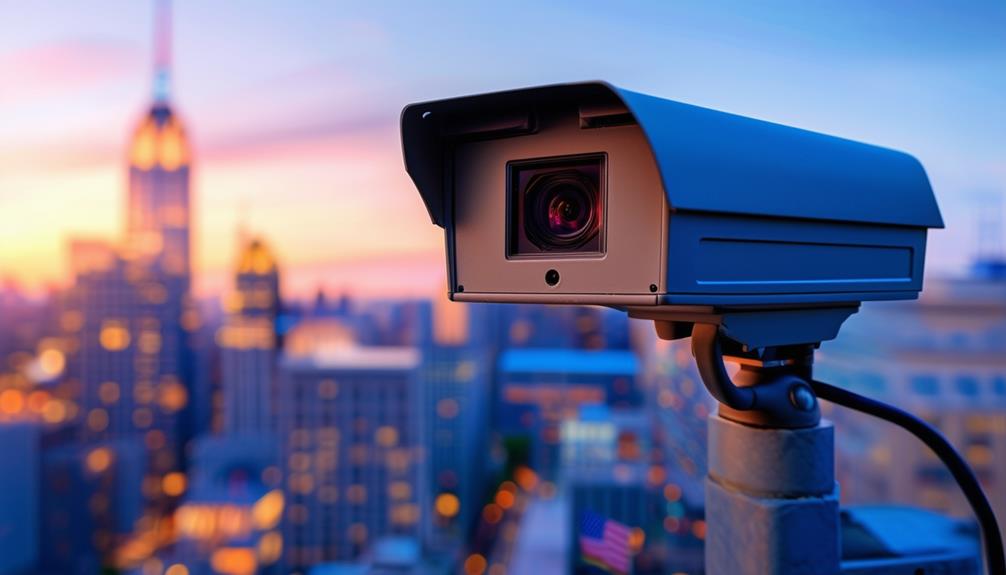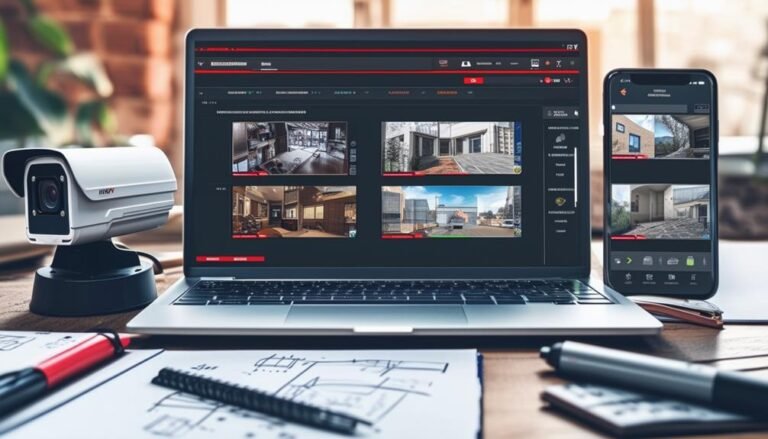Hikvision isn’t NDAA compliant because of its ties to the Chinese government, which raises serious national security concerns. This non-compliance affects its ability to secure federal contracts, so if you’re considering their products, it’s vital to understand these implications. Many organizations are re-evaluating their partnerships with Hikvision due to potential risks, and the conversation around compliance is evolving. Staying informed on this topic can help you make better decisions regarding your technology choices. There’s more to uncover about Hikvision’s regulatory challenges and the alternatives available in the market.
Overview of NDAA Compliance
NDAA compliance is fundamental for companies dealing with government contracts and procurement. The National Defense Authorization Act (NDAA) sets strict guidelines aimed at protecting national security and guaranteeing that taxpayer dollars aren’t spent on products or services that could compromise your freedom. If you’re in the business of providing goods or services to the government, you need to understand these requirements. Non-compliance can lead to penalties, contract cancellations, and even criminal charges, so it’s imperative to stay informed.
NDAA compliance primarily revolves around Section 889, which prohibits federal agencies from using or procuring certain technologies from specific companies deemed a threat to national security. This means you have to carefully vet your supply chain and ascertain that your partners also comply. If you’re working with manufacturers or vendors, knowing where their products come from is essential.
Moreover, compliance isn’t a one-time checklist, but an ongoing process. You’ll need to regularly review and update your practices to align with evolving regulations. Staying proactive not only safeguards your business but also contributes to a larger commitment to maintaining the freedoms we cherish.
In an age where technology plays a significant role in our lives, it’s crucial to prioritize solutions that protect our rights and security. Understanding NDAA compliance isn’t just a legal obligation; it’s a step toward ensuring that your contributions to government contracts support a free and secure society.
Hikvision Company Background
To understand Hikvision’s NDAA compliance, it is crucial to look at the company’s background. Founded in 2001, Hikvision has grown to become a leader in video surveillance products and solutions. Their commitment to innovation is evident in their diverse product portfolio, which continues to evolve with technological advancements.
Company Overview and History
Founded in 2001, Hikvision has rapidly emerged as a leading global provider of video surveillance products and solutions. You might be intrigued to know that the company started as a small research and development team in Hangzhou, China. Over the years, it has grown considerably, expanding its operations worldwide. With a focus on innovation and quality, Hikvision has cultivated a reputation for delivering cutting-edge technology, catering to various sectors like transportation, retail, and public safety.
You’ll appreciate that Hikvision has prioritized research and development, investing heavily in advanced technologies such as artificial intelligence and big data analytics. This commitment to progress has allowed them to stay ahead of the competition and offer robust solutions tailored to meet diverse customer needs.
As a company, Hikvision emphasizes the importance of security and privacy, endeavoring to provide reliable products that empower users. Their global reach is impressive, with numerous subsidiaries and a vast network of partners. By harnessing the power of surveillance technology, Hikvision aims to foster safer environments, giving individuals and organizations peace of mind.
Product Portfolio and Innovation
Hikvision’s commitment to innovation is evident in its extensive product portfolio, which includes a wide range of video surveillance solutions, access control systems, and smart home technologies. You’ll find cutting-edge cameras equipped with AI analytics, enabling you to monitor your space intelligently and efficiently. Whether you’re protecting your home or business, Hikvision’s products cater to various security needs.
Their access control systems enhance security while ensuring seamless entry for authorized personnel, allowing you to maintain control over who enters your premises. Plus, their smart home technologies integrate with various devices, empowering you to create a connected environment that prioritizes your safety and comfort.
Hikvision’s focus on innovation means they’re consistently updating their offerings to match evolving market demands. You can expect features like remote access, real-time alerts, and easy installation processes that make your life easier. By investing in their products, you’re not just choosing a brand; you’re opting for freedom and peace of mind in managing your security solutions. With Hikvision, you can embrace modern technology without compromising on the safety and autonomy you deserve.
Key NDAA Provisions
Understanding the key provisions of the National Defense Authorization Act (NDAA) is vital for organizations that rely on security technology. The NDAA outlines specific guidelines that affect procurement and use of surveillance equipment, especially from companies deemed a national security threat. Here are some critical provisions you should be aware of:
| Provision | Description | Impact on Organizations |
|---|---|---|
| Ban on Certain Vendors | Prohibits purchasing from entities linked to foreign adversaries, including China. | Limits options for security technology. |
| Reporting Requirements | Mandates reporting of incidents involving covered technologies. | Increases accountability and transparency. |
| Compliance Audits | Requires regular audits to guarantee adherence to NDAA standards. | Necessitates ongoing evaluation of vendors. |
Organizations must evaluate their current security setups to guarantee compliance with these provisions. Non-compliance can not only result in legal ramifications but also compromise your operational integrity and public trust.
Moreover, the NDAA emphasizes the importance of safeguarding technology that could potentially jeopardize national security. By understanding these provisions, you can make informed decisions that align with your organization’s values of freedom and security. This way, you can continue to protect your assets without compromising the principles that matter most to you and your stakeholders.
Hikvision’s Compliance Status
When it comes to Hikvision’s compliance with NDAA regulations, it’s essential to understand their current status. You’ll want to take into account the challenges the company faces in meeting these regulatory requirements. This overview will help clarify what compliance means for Hikvision and the implications for users like you.
Overview of NDAA Compliance
The compliance status of Hikvision regarding the National Defense Authorization Act (NDAA) has garnered significant attention in recent years. As you explore the implications of this legislation, it’s crucial to understand that the NDAA prohibits federal agencies from purchasing certain products from companies deemed to pose a national security risk. Hikvision, a prominent player in the surveillance industry, is often scrutinized due to concerns about its ties to the Chinese government.
You might wonder how this affects your decision-making. The NDAA compliance status can directly impact your organization’s ability to procure Hikvision products. If you’re aligned with federal contracts or entities, you need to be aware of the restrictions, as non-compliance could lead to serious consequences, including financial penalties.
Hikvision has made efforts to address these concerns, but the landscape is ever-changing, and challenges persist. As you evaluate your options, consider the implications of using their technology in light of the NDAA. Ultimately, staying informed will empower you to make choices that align with your values and guarantee your freedom in leveraging technology responsibly.
Hikvision’s Regulatory Challenges
As concerns around national security continue to rise, Hikvision faces mounting regulatory challenges that complicate its compliance status. The U.S. government’s scrutiny over companies with ties to foreign adversaries creates a tough environment for Hikvision, a Chinese firm. You might feel uneasy knowing that this company has been linked to surveillance practices that some argue infringe on individual freedoms.
The National Defense Authorization Act (NDAA) prohibits federal agencies from using Hikvision products, which raises questions about its future in the U.S. market. If you’re a consumer or business considering their technology, you’re likely weighing the implications of this compliance status.
Moreover, ongoing geopolitical tensions could lead to further restrictions or even bans. This uncertainty not only affects Hikvision’s operations but also impacts you as a potential user of their products. You deserve transparency and assurance that the technology you use won’t compromise your rights.
As regulations evolve, staying informed about Hikvision’s compliance status is essential for making choices that align with your values of freedom and security. In this landscape, understanding the implications of these regulatory challenges is key for your decision-making.
Government Restrictions on Hikvision
Government restrictions on Hikvision have become increasingly prominent in recent years, particularly due to concerns over national security and data privacy. As you navigate this landscape, it’s important to understand the implications of these restrictions on your choices and freedoms. More and more, governments around the world are scrutinizing Hikvision’s operations, citing the company’s ties to the Chinese government and potential risks to sensitive data.
You might find that some countries have imposed bans or limitations on the use of Hikvision products, especially in critical infrastructure sectors. These restrictions aren’t just arbitrary; they stem from real fears regarding surveillance and data interception. As a consumer or business, this could impact your ability to freely choose technology solutions that best meet your needs. It’s necessary to weigh the benefits of Hikvision’s advanced technology against the backdrop of these restrictions.
Moreover, the pressure from government agencies can trickle down to private companies, forcing them to reconsider their partnerships with Hikvision. If you’re working within a regulated industry, you may face additional hurdles when trying to integrate Hikvision products into your operations.
Ultimately, it’s important to stay informed about these government restrictions and their implications. Your freedom to choose technology should align with your values around privacy and security. As the landscape continues to evolve, being proactive and aware will empower you to make decisions that prioritize both your needs and your principles.
Impacts on U.S. Government Contracts
Hikvision’s involvement in U.S. government contracts has faced significant scrutiny due to national security concerns. As a government contractor, you need to be aware of the implications of NDAA compliance. If you’re considering using Hikvision products, it’s important to recognize that many federal agencies are prohibited from contracting with companies that don’t meet these compliance standards. This restriction means that you could miss out on potential opportunities or face challenges if you decide to use their technology.
Moreover, the negative perception surrounding Hikvision can affect your organization’s reputation. If you’re associated with a brand that’s under fire for national security issues, stakeholders, including the public and potential partners, might question your commitment to safeguarding sensitive information. This skepticism could hinder your ability to secure future contracts or collaborations, as trust is a significant component in government dealings.
In addition, if you’re already engaged in a contract with Hikvision, you may need to evaluate your compliance status regularly. Non-compliance could lead to contract termination or financial repercussions, impacting your organization’s budget and resources. It’s important to stay informed about any changes in regulations and the ongoing debate surrounding Hikvision’s role in national security.
Ultimately, when steering through U.S. government contracts, it’s significant to prioritize compliance and the potential fallout from using products associated with controversies. Your organization’s ability to thrive in this environment depends on being proactive and making informed decisions.
Alternatives to Hikvision Products
If you’re looking for alternatives to Hikvision products, there are plenty of competing surveillance brands to evaluate. Additionally, open-source security solutions might offer flexibility and customization that fits your needs. Exploring these options can help you find the right fit while ensuring compliance and security.
Competing Surveillance Brands
When considering alternatives to Hikvision products, a variety of surveillance brands stand out in the market. These brands offer innovative features, robust security, and respect for user privacy, giving you more options to choose from for your surveillance needs.
Here are three significant competitors:
- Axis Communications: Known for high-quality video surveillance solutions, Axis provides a wide range of network cameras and accessories, prioritizing cybersecurity and user privacy.
- Dahua Technology: Another major player in the industry, Dahua offers an extensive line of IP cameras and video management software. They focus on advanced technology and adaptability for different surveillance needs.
- Bosch Security Systems: Bosch offers a variety of surveillance solutions, from cameras to integrated security systems. Their products emphasize reliability and ease of use, making them a solid choice for both residential and commercial setups.
Open-Source Security Solutions
Exploring open-source security solutions can provide a viable alternative to proprietary products like those from Hikvision. Open-source systems give you the freedom to customize and adapt your security setup without being tied to a single vendor’s constraints. Solutions like ZoneMinder, Shinobi, or MotionEye are built by communities that prioritize transparency and user control, allowing you to maintain autonomy over your data.
With open-source software, you can tweak configurations to fit your specific needs, minimizing vulnerabilities and maximizing efficiency. You won’t be limited by the features that a commercial provider dictates. Instead, you can benefit from frequent updates and a supportive community that contributes to the software’s development.
Moreover, using open-source solutions often means lower costs. You won’t have to pay for licensing fees or proprietary hardware, which can be significant when scaling your security operations. By choosing open-source, you’re not just opting for an alternative; you’re embracing a philosophy of freedom and empowerment in managing your security infrastructure. So, if you’re looking for flexibility and independence, consider diving into the world of open-source security solutions. You’ll be taking a significant step toward self-reliance.
User Concerns and Considerations
As users navigate the complexities of Hikvision’s NDAA compliance, several concerns and considerations come to the forefront. You might be wondering whether your choice of Hikvision products aligns with your values, especially when it comes to security and privacy. The implications of using a non-compliant vendor can be significant, affecting not only your peace of mind but also your organizational integrity.
Here are a few key points you should consider:
- Data Privacy: Are you comfortable with how your data is handled? The risk of unauthorized access or data breaches is a valid concern, particularly if you’re dealing with sensitive information.
- Regulatory Compliance: You need to guarantee that your organization complies with all relevant regulations. Non-compliance could lead to legal repercussions, which can be costly and damaging.
- Vendor Reputation: The reputation of Hikvision and its compliance status can impact how your stakeholders view your organization. A negative perception may hinder trust and partnerships in the long run.
Ultimately, it’s crucial to weigh these factors carefully. While Hikvision offers a range of advanced products, your commitment to freedom and ethical considerations shouldn’t be overlooked. By staying informed and proactive, you can make a choice that aligns with your principles and secures your environment while maintaining your integrity.
Future of NDAA Compliance
The future of NDAA compliance is likely to evolve as technology and regulations continue to change. As you navigate this landscape, you’ll need to stay informed about new developments that could affect the compliance status of companies like Hikvision. With the rapid advancement of surveillance technology, it’s vital to anticipate how these innovations might intersect with regulatory frameworks. You might find that the government’s stance on compliance could shift based on emerging threats or changes in international relations.
Moreover, as you consider your options, pay attention to the growing emphasis on cybersecurity. As threats become more sophisticated, the focus on data protection will likely increase, influencing how compliance is defined. This could mean that companies will need to not only meet current NDAA stipulations but also adapt to new requirements that prioritize user data security and privacy.
You’ll also want to keep an eye on market trends. As consumers demand greater transparency and responsibility from tech companies, businesses may feel pressure to enhance their compliance measures proactively. This shift could lead to a more stringent regulatory environment, pushing companies to adopt practices that align with broader security and ethical standards.
In this evolving context, your choices as a consumer will play a significant role. The more informed you are about the implications of NDAA compliance, the better equipped you’ll be to make decisions that reflect your values and priorities in a world where technology and freedom are increasingly intertwined.
Industry Reactions and Perspectives
With the evolving landscape of NDAA compliance, industry reactions and perspectives have become increasingly diverse. As the debate around Hikvision’s compliance status heats up, stakeholders from various sectors are voicing their opinions. You might find it intriguing how these reactions span a broad spectrum, reflecting the complexities of national security, technology, and commerce.
Here are some key perspectives you should consider:
- Security Concerns: Many security professionals express apprehension about using Hikvision products due to potential vulnerabilities and ties to foreign entities. They argue that using non-compliant equipment could jeopardize sensitive information.
- Business Interests: On the other hand, some businesses advocate for the continued use of Hikvision products, citing cost-effectiveness and functionality. They argue that banning such products could stifle competition and innovation in the marketplace.
- Regulatory Compliance: Compliance officers and legal experts are weighing in on the intricacies of the NDAA. They highlight the need for clear guidelines to navigate the murky waters of compliance, emphasizing that businesses must be vigilant and proactive in their assessments.
Your perspective on these reactions can shape how you approach the issue of NDAA compliance. As the landscape continues to shift, staying informed and open-minded will empower you to make choices that align with your values and objectives. Ultimately, fostering an environment of transparency and accountability is key to ensuring that technology serves the freedom and security we all cherish.
Frequently Asked Questions
What Products Does Hikvision Offer That Are NDAA Compliant?
Hikvision offers a range of products that meet NDAA compliance, including advanced security cameras, video management systems, and access control solutions. If you’re looking for reliable surveillance options, their NDAA-compliant cameras feature high resolution and smart analytics to enhance your security. You’ll find options tailored for various applications, ensuring you can maintain your freedom and safety while adhering to regulatory standards. Explore their offerings to find the perfect fit for your needs.
How Can Consumers Verify Hikvision’s Compliance Status?
To verify Hikvision’s compliance status, you can start by checking the company’s official website for any compliance statements or certifications. Look for product specifications and documentation that highlight NDAA compliance. Additionally, consider searching for third-party reviews or industry reports that address compliance issues. Engaging with forums or communities focused on security products can provide insights from other consumers who’ve done their research. It is crucial to gather information from multiple sources for a well-rounded view.
What Steps Is Hikvision Taking to Ensure Future Compliance?
Hikvision’s on a mission, and it’s not just any mission—it’s a compliance crusade! To guarantee future compliance, they’re ramping up transparency and enhancing security measures. You can expect them to adopt stricter internal policies, undergo regular audits, and engage with industry standards. By doing this, they’re aiming to build trust and demonstrate their commitment to security and freedom, making certain you feel safe with their products in your hands.
Are There Any Legal Ramifications for Using Non-Compliant Hikvision Products?
If you use non-compliant Hikvision products, you could face legal ramifications. Laws and regulations can vary, but potential consequences might include fines or restrictions on usage. You may also encounter challenges in securing contracts or funding, as many organizations prioritize compliance. It is crucial to stay informed about the legal landscape, ensuring you’re not inadvertently putting yourself at risk. Being proactive about compliance can safeguard your interests and maintain your freedom to operate.
How Do Hikvision’s Competitors Handle NDAA Compliance?
When it comes to NDAA compliance, you’ll find competitors like Axis, Bosch, and Hanwha take it seriously. They’re ensuring their products meet legal standards, promoting trust and reliability. By prioritizing compliance, they’re protecting your interests and providing peace of mind. They’re not just talking the talk; they’re walking the walk, offering solutions that align with your values of freedom and security. So, if compliance matters to you, these brands are worth considering.



